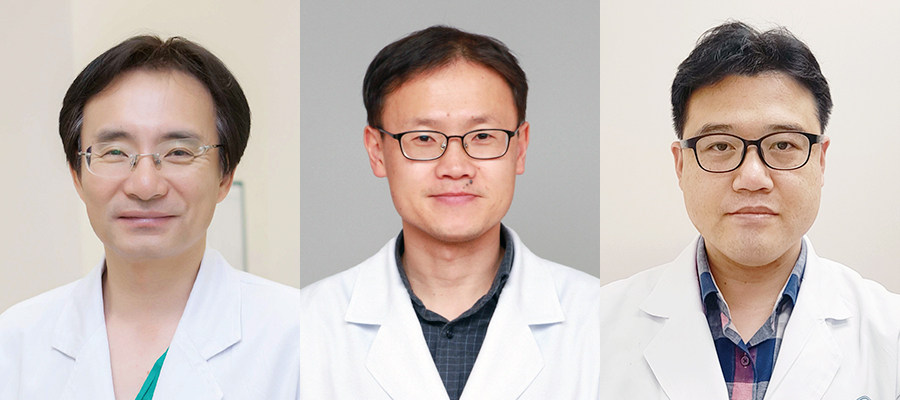-
- Global AMC MENU
- NEWS
- HEALTH
- PEOPLE
- Introduction

▲ (from the left) Professor Song Cheol Kim, Professor Eunsung Jun, and Professor Suhwan Chang
Early detection is important for pancreatic cancer as it is one of the human solid tumors with the worst prognosis. However, CA19-9 currently in use as a marker for early diagnosis of pancreatic cancer has limitations due to insufficient accuracy.
Professor Song Cheol Kim of the Division of Hepatobiliary and Pancreatic Surgery and Professor Eunsung Jun of the Department of Convergence Medicine recently published the results of a study in ‘Gastroenterology’ that improved the accuracy of a pancreatic cancer diagnostic marker. The study was a multinational and multicenter research that was participated by diverse hospitals including the Beckman Research Institute in the U.S. and Prince of Wales Hospital, Chinese University of Hong Kong.
The research team conducted sampling of miRNA (micro RNA) panel, one of the tumor-derived exosomes from pancreatic cancer patients, and used machine learning algorithms on key miRNAs to develop a diagnostic method with 94% accuracy, 92% sensitivity and 97% specificity. It was also confirmed that the diagnostic accuracy further improved when used together with CA19-9. In particular, it showed excellent diagnostic performance for early pancreatic cancer diagnosis (stages 1 or 2).
In the meantime, a research team led by Professor Song Cheol Kim and Professor Suhwan Chang of the Department of Biomedical Sciences have demonstrated that GAL-3BP antibody is an important therapeutic target and can be used to significantly block the metastasis of pancreatic cancer. The findings of pancreatic cancer treatment using GAL-3BP antibody was published in the latest volume of ‘Proceedings of the National Academy of Science (PNAS)’ of the United States.
Professor Song Cheol Kim said, “It is my anticipation that the results of this research will help diagnose early pancreatic cancer and provide treatment in a non-invasive way. I hope this biomarker and therapy will be applied well in the clinical settings so that better treatment outcomes can be achieved in patients with pancreatic cancer.”












